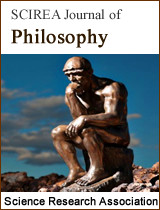The Deductibility of the Aristotelian Modal Syllogism E⼞I◇O-4 from the Perspective of Mathematical Structuralism
DOI: 10.54647/philosophy720089 31 Downloads 14707 Views
Author(s)
Abstract
This paper firstly provides knowledge representations of Aristotelian modal syllogisms from the perspective of mathematical structuralism, and proves the validity of Aristotelian modal syllogism E⼞I◇O-4, and then by making full use of relevant definitions, facts, and some inference rules, formally derive other 30 valid modal syllogisms on the basis of one modal syllogism (i.e. E⼞I◇O-4) as a basic axiom. The reason why modal syllogisms are deducible is that the four Aristotelian quantifiers (i.e. all, no, some, and not all) can be mutually defined, and that so can the two modalities (i.e. ⼞ and ◇). Thus, one can establish a minimalist formal axiomatic system for modal syllogistic logic. This formal method is not only beneficial for the study of other types of syllogisms, but also for the development of a more intelligent inference engine for expert systems.
Keywords
Aristotelian modal syllogism; Aristotelian quantifier; symmetry; deducible relation
Cite this paper
Feifei Yang, Xiaojun Zhang,
The Deductibility of the Aristotelian Modal Syllogism E⼞I◇O-4 from the Perspective of Mathematical Structuralism
, SCIREA Journal of Philosophy.
Volume 4, Issue 1, February 2024 | PP. 23-33.
10.54647/philosophy720089
References
| [ 1 ] | Chater N and Oaksford M. (1999) the probability Heuristics model of syllogistic reasoning, Cognitive Psychology, Vol. 38: 191-258. |
| [ 2 ] | Westerståhl D. (1989) Aristotelian syllogisms and generalized quantifiers, Studia Logica, Vol. XLVII, No. 4, pp. 577-585. |
| [ 3 ] | Hui L. (2023) Reduction between Categorical Syllogisms Based on the Syllogism EIO-2. Applied Science and Innovative Research, 7(1): 30-37. |
| [ 4 ] | Xiaojun Z and Baoxiang W. (2021) Research on Chinese Textual Reasoning. Beijing: People’s Publishing House. (in Chinese) |
| [ 5 ] | Cheng Z. (2023) How to Deduce the Other 91 Valid Aristotelian Modal Syllogisms from the Syllogism ⼞I⼞A⼞I-3. Applied Science and Innovative Research, 7(1): 46-57. |
| [ 6 ] | Jing X and Xiaojun Z. (2023) The Reducibility of Generalized Modal Syllogisms Based on ⼞AM◇I-1. SCIREA Journal of Philosophy, 3(1):1-11. |
| [ 7 ] | Łukasiewicz J. (1957) Aristotle’s Syllogistic: From the Standpoint of Modern Formal Logic. second edition, Oxford: Clerndon Press. |
| [ 8 ] | McCall S. (1963) Aristotle’s Modal Syllogisms, Studies in Logic and the Foundations of Mathematics. North- Holland Publishing Company. |
| [ 9 ] | Striker G. (1994) Assertoric vs. Modal Syllogistic. Ancient Philosophy, 14:39-51. |
| [ 10 ] | Brennan T. (1997) Aristotle’s Modal Syllogistic. A Discussion of R. Patterson, Aristotle’s Modal Logic. Oxford Studies in Ancient Philosophy, 15: 207-231. |
| [ 11 ] | Malink M. (2013) Aristotle’s Modal Syllogistic. Harvard University Press. |
| [ 12 ] | Xiaojun Z. (2020) Screening out All Valid Aristotelian Modal Syllogisms. Applied and Computatio nal Mathematics, 8: 95-104. |
| [ 13 ] | Long W and Xiaojun Z. (2023) How to Dedrive the other 37 Valid Modal Syllogisms from the Syllogism ◇A⼞I◇I-1, International Journal of Social Science Studies, 11(3): 32-37. |
| [ 14 ] | Chellas F. (1980) Modal Logic: an Introduction. Cambridge University Press. |
| [ 15 ] | Peters S and Westerståhl D. (2006) Quantifiers in Language and Logic. Claredon Press, Oxford. |
| [ 16 ] | Xiaojun Z. (2018) Axiomatization of Aristotelian Syllogistic Logic Based on Generalized Quantifier Theory. Applied and Computational Mathematics. Vol. 7, No. 3: 167-172. |
| [ 17 ] | Hamilton A G. (1978) Logic for Mathematicians. Cambridge: Cambridge University Press. |

